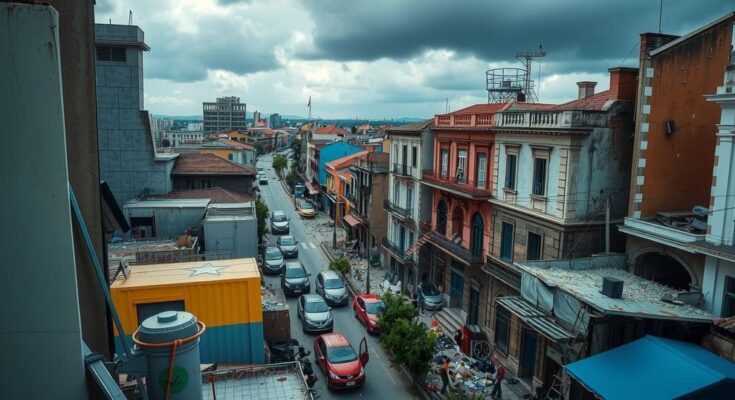An earthquake registering 6.8 on the Richter scale hit eastern Cuba, heightening challenges for residents reeling from recent storms. With significant damage reported, especially in Santiago de Cuba and Granma, President Diaz-Canel has prioritized safety and damage assessment amidst fears of structural vulnerability in older buildings. This disaster adds to the ongoing turmoil following Hurricane Oscar and Hurricane Rafael, which caused extensive destruction and displacement.
A 6.8-magnitude earthquake struck eastern Cuba, compounding the hardships faced by residents still recovering from recent storms. The United States Geological Survey (USGS) reported that the earthquake occurred approximately 40 kilometers south of Bartolome Maso. While there have been no immediate reports of fatalities or injuries, substantial damage has been noted, including landslides and infrastructure collapse, particularly affecting the provinces of Santiago de Cuba and Granma. Cuban President Miguel Diaz-Canel indicated that assessment and recovery efforts are underway, emphasizing the necessity of prioritizing life preservation. Local residents described this earthquake as one of the strongest they have experienced, highlighting the vulnerability of older buildings in the region. Several eyewitness accounts revealed a palpable sense of fear as structures swayed, prompting many individuals to seek safety in doorways. Images disseminated through state-run media showcased significant structural damage, particularly to residential homes and public infrastructure. This incident marks another challenge for Cuba, which is grappling with a series of natural disasters that have exacerbated existing economic and infrastructural difficulties. Recently, Hurricane Oscar resulted in extensive power outages and fatalities, while Hurricane Rafael caused further devastation and displacement across the nation. Reports suggest that nearby regions, including Jamaica, felt the earthquake’s tremors, showcasing the broader impact of this geological event.
The recent earthquake in eastern Cuba comes at a time when the country is already dealing with severe challenges due to recent storms, particularly Hurricane Oscar and Hurricane Rafael. These disasters have not only resulted in loss of life but have also led to widespread infrastructural collapse and a serious energy crisis. Cuba’s infrastructure has been under strain from economic difficulties, and these natural events have intensified the vulnerabilities of homes and public facilities, making it essential for the government to conduct thorough damage assessments and recovery plans.
In conclusion, the 6.8-magnitude earthquake in eastern Cuba adds to the difficulties faced by a country already struggling with the aftermath of severe storms and economic instability. With a focus on recovery and safety, authorities are assessing the damage while residents cope with the fear and impact of such a powerful seismic event. The ongoing cycle of natural disasters emphasizes the need for improved infrastructure and emergency preparedness in the region.
Original Source: www.aljazeera.com




